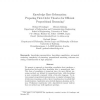759 search results - page 21 / 152 » A Perspective on Knowledge Compilation |
ECTEL
2010
Springer
13 years 7 months ago
2010
Springer
As Technology Enhanced Learning (TEL) systems become more essential to education there is an increasing need for their creators to reduce risk and to design for success. We argue t...
VLDB
1993
ACM
13 years 11 months ago
1993
ACM
The enforcement of semantic integrity constraints in data and knowledge bases constitutea a major performance bottleneck. Integrity constraint simplification methods aim at reduci...
SCAI
1993
13 years 8 months ago
1993
In this paper the problems of organization and representation of concept knowledge are addressed from an autonomous agent perspective. The first part of the paper discusses the qu...
IJPRAI
2000
13 years 7 months ago
2000
We present an approach to knowledge compilation that transforms a function-free first-order Horn knowledge base to propositional logic. This form of compilation is important since...
CORR
2010
Springer
13 years 7 months ago
2010
Springer
The (neo-)evolutionary model of a Triple Helix of University-Industry-Government Relations focuses on the overlay of expectations, communications, and interactions that potentiall...

